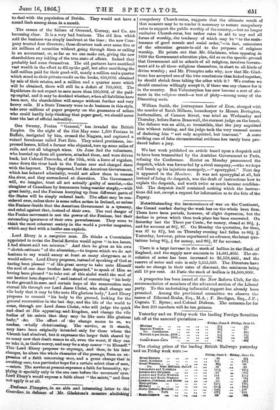Lord Ebury is a . sanguine man. He thinks a
Commission appointed to revise the Burial Service would agree "in ten hours,
I had almost said ten minutes." And .then he gives us his own " sketch-estimate" of the alteration,—to impose which we do not -hesitate to say would annoy at least as many clergymen as it would relieve. Lord Ebury proposes, instead of speaking of God as having been pleased "of His great mercy to take unto Himself the soul of .our dear brother here departed," to speak of Him as having been pleased "to take out of this sinful world the soul of our brother here departed ;" and instead of committing "his body to the ground in sure. and certain hope of the resurrection unto eternal life through our Lord Jesus Christ, who shall change our vile body that it may be like unto His glorious body," Lord Ebury proposes to commit "his body to the ground, looking for the general resurrection,in the last day, and the life of the world to coulee through our Lord Jesus Christ, who will judge the quick -and ,dead at His appearing and ;kingdom, and change the vile bodies of his saints that they may be like unto His glorious body," &c. The effect of the change seems to us, we confess, wholly deteriorating. The service, as it stands, may have been originally intended only for those whom the Church had absolved, but it expresses the larger faith shared by so many now that. death comes to all, even the worst, if they can so take it, in God's mercy, and may-be a step nearer "to Himself." This Lord Ebury -proposes to expunge, and then, in his later changes, he alters the whole character of the passage, from an ex- pression of a faith concerning man, and a great change that is awaiting- man, to a particular hope for a certain select class of men, —saints. The service at present expresses a faith for humanity, ap- plying it specially only in the one case before the mourners' eyes. Lord Ebury's would express a faith about "the saints," and does not apply it at all.






























 Previous page
Previous page